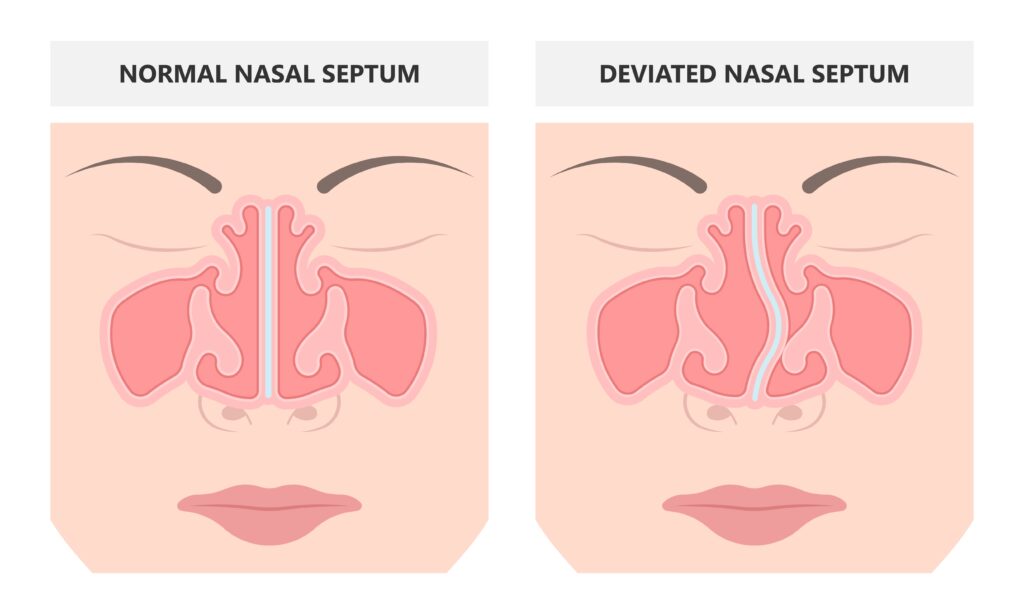Posted by: Maryland ENT in General
Do you snore from time to time? Many people snore, which may not always be due to an underlying condition.
Your nose may be blocked, or you may have a cold that causes severe congestion. These are some of the more common reasons that you may find yourself snoring.
But these usually resolve on their own after a while. However, in other instances, snoring can be a sign of something much more serious and concerning.
Keep reading to learn more about the causes of snoring and about 7 reasons snoring can be a sign of something more concerning.
Why Do People Snore?
The air you breathe normally moves through a clear passage when you sleep. But if your airway becomes narrower because of a blockage, it can lead to snoring.
Snoring is the sound made when tissues like the soft palate or uvula inside your airway vibrate.
Many factors can contribute to snoring. They include:
1. Cardiovascular Disease

Snoring can be an early warning sign of cardiovascular disease. Studies reveal that people who snore but don’t have sleeping disorders are more likely to develop thicker carotid arteries.
Having thicker carotid arteries has links to cardiovascular disease. When you snore excessively, the vibrations you create can cause your carotid arteries to become inflamed and, as a result, thicken.
Thicker and inflamed carotid arteries increase your risk for stroke and other cardiovascular diseases.
2. Obstructive Sleep Apnea
If your partner has noticed you snore frequently and loudly and sometimes choke or gasp for air at night, you might have sleep apnea. Obstructive sleep apnea is a serious sleep disorder.
Obstructive sleep apnea causes your airway to partially or entirely collapse while you sleep. When this happens, you stop breathing for 10 seconds or more at a time. These episodes can occur hundreds of times throughout the night.
When your breathing pauses, it causes you to jolt yourself awake each time to start breathing again. Obstructive sleep apnea affects your quality of sleep.
It also leads to daytime fatigue, a lack of concentration, forgetfulness, anxiety, and depression. Worse still, untreated obstructive sleep apnea can result in health problems like diabetes, stroke, high blood pressure, heart failure, obesity, arrhythmias, and cardiomyopathy.

3. Obesity
If you regularly snore, it can also be an indication of obesity. Being overweight leads to a buildup of excess body fat that strains your joints and heart.
Besides overworking your joints and hearts, this leads to extra fat getting deposited throughout your body, including your neck. As a result, the accumulated fat can put pressure on your throat, leading to an obstructed airway and snoring at night.
4. Hypothyroidism
When you have hypothyroidism, your thyroid doesn’t produce enough hormones. Some common symptoms of hypothyroidism include snoring, fatigue, depression, being sensitive to cold, brittle nails and hair, and dry skin.
Experiencing these symptoms and finding out you also snore consistently could mean that the culprit is an underperforming thyroid.
5. Deviated Septum

Snoring could signal a deviated septum. Your septum is the dividing wall in your nose and has cartilage and bone.
The septum may deviate in an S-shape, obstructing both nasal passages. It can also shift to one side, causing one nasal passage to become narrower than the other. Blocked nasal passages interfere with airflow, causing loud snoring.
6. Nasal Polyps
Another reason that could explain why you snore is if you have nasal polyps. Polyps are growths that form in inflamed tissue of your sinuses and nose.
Although nasal polyps aren’t a cause for concern on their own, trouble can arise when there’re substantial growths or clusters of polyps.
These can block your nose.
You’ll breathe through your mouth as you sleep in response to the blockage. Breathing through your nose causes you to snore. In such a situation, polyps interfere with your sleep and affect your overall health.
7. Sinus Problems

Sinusitis develops when your sinuses become inflamed. For many people, sinusitis can also become a chronic problem.
Just like nasal polyps, sinusitis can leave your nose congested and prevent you from breathing through the nose. As a result, you’ll be forced to breathe through the mouth.
Mouth breathing at night can make your throat muscles relax too much and narrow your airway, causing you to snore. It’s hard to achieve a good night’s sleep with a stuffy nose.
People who snore and have chronic sinusitis often feel that they haven’t slept all night or that the sleep they got wasn’t restful.
When to See an ENT Specialist About Snoring

If you have concerns about your snoring, here are some signs that it may be time to see your ENT specialist:
- Your partner complains that you snore loudly and keep them awake at night
- Ongoing insomnia
- Choking or gasping at night
- Feeling tired and exhausted every day
- Waking up with a sore throat or dry mouth
- Morning headaches
- Feeling pain that prevents you from sleeping
- Being very moody and irritable
Once you discuss your symptoms with your ENT specialist at Maryland ENT, they’ll likely recommend tests to determine what’s going on with you and offer the most appropriate treatment if necessary.
Find Lasting Relief from Your Snoring

If your partner or roommate notices you snore often, it’s time to see an ENT specialist at Maryland ENT. Because snoring can sometimes have serious health consequences, you shouldn’t ignore it.
The expert ENT specialists at Maryland ENT will get to the bottom of your snoring and provide an effective and lasting solution.
Want to find out what’s causing your snoring and how to treat it? Schedule an appointment at Maryland ENT in Baltimore and Lutherville, MD, today and get the relief you need!



